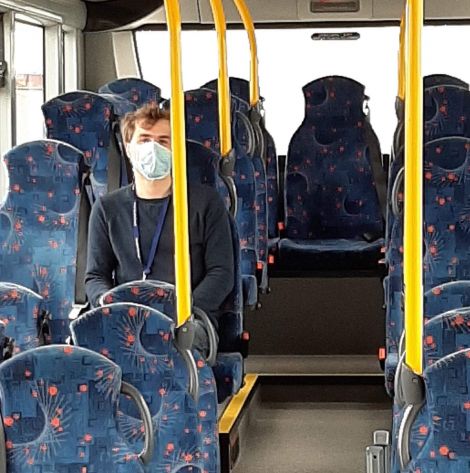ZetTrans / Future of transport reaches turning point
ZetTrans’ policy and project officer Robina Barton makes the case for increased use of public transport in difficult times
MONDAY will see the end of an era, as new ZetTrans public bus contracts come into force without Leasks of Lerwick.
After transporting Shetland residents and visitors for more than 100 years John Leask and Son will cease trading in September. Their familiar buses will be a big miss on Shetland’s roads, and we wish Peter, Andrew, their families and staff well for the future.
Leasks operations have run in parallel with the rise and rise of motorised transport, which also commenced in the early 20th century. Starting out with a single car, perhaps John Leask could see the scale of difference transport could make in a place like Shetland.
When Peter and Andrew’s father Jimmy came of age to get a driving license, the expansion began and 10 years later came their first bus. Developments continued in step with the changing face of mobility and looking back at the history of the company serves to provide a fascinating insight into transport in the isles and the opportunities this has brought.
They leave us at a transportation turning point, as we strive to tackle three major challenges: climate change, societal inequalities and poor public health.
The last two have been highlighted, and made more complex by the coronavirus pandemic, which has impacted people on low incomes, and people with underlying health conditions most severely. How we approach transport, individually and as a society, will play a major role in our success or failure in addressing these challenges.
Transport is the largest sectoral carbon emitter in the UK, contributing 28 per cent of domestic emissions in 2018. Shetland’s emissions are significantly higher than the Scottish average, and community planning is focussed on reducing this gap.
Overall emissions dropped between 2015 and 2017 but Shetland’s transport carbon footprint increased in comparison to the national average over the same timescale – unsurprising given our reliance on the private car.
2015 car ownership in Shetland was 13 per cent above the national average. 2018 data is slightly more encouraging, with this figure dropping to 12 per cent and our transport emissions showing a slight decline, but there is a serious need for significant and sustained improvement.
Active travel is one way we can help to combat climate change, and move towards a more equal society, but it can only go so far. Walking and cycling short distances within settlements is one thing – travelling several miles between them is quite another.
If we are to avoid continued reliance on the private car, we must turn to shared and public transport.
Shetland’s public bus network comprises mainline and feeder services, with dial-a-rides providing demand responsive provision. As the main service centre, it is possible to commute to Lerwick by bus for a 9-5 workday, and at lunch times, six days a week from most parts of Shetland.
The same is true of Brae, Scalloway and Sandwick. Most outlying rural areas have a local shopping service one or two days a week. The new contracts will see an increased bus service linking Lerwick to Sumburgh airport and an improved town service that better serves the college.
Research by Shetland’s Commission for Tackling Inequalities highlighted that the cost and availability of transport influence individuals’ ability to gain access to employment, services and social opportunities.
A fares policy review will soon be underway, aimed at ensuring that fares support widespread sustainable transport use but there is a delicate balance to be found. In a situation where the public bus service is 100 per cent subsidised by the local authority, any reduction in fare income impacts future investment in service provision.
Combining public and school service contracts is one way to save costs by allowing for the most efficient use of resources across Shetland. The new network of public and school transport services comprises 166 contracts covering 59 public services and 107 dedicated school services.
However, there is no doubt that more people choosing to use Shetland’s bus services is the best way to sustain the network and allow for service growth. We want to encourage and support people to make this choice.
We cannot underestimate the challenge presented by Covid-19. Social distancing means that public transport capacity will only be 30 per cent of pre-Covid levels for the foreseeable future.
Our buses cannot cope with a large influx of new users just now – the focus is on ensuring provision for those who rely on the service. Furthermore, all users must do their bit to protect the service, and those around them, by following hygiene and social distancing guidelines and wearing face coverings on board all vehicles unless medically exempt.
Nevertheless, ‘this also will pass’ as my grandmother used to say. After the recovery comes the renewal, and our aspiration is to see people getting out of their cars and travelling to more destinations on board Shetland’s buses.
ZetTrans will be giving out clear messages on service capacity going forwards, and is working on ways to improve information provision to help people plan multi-modal journeys.
By 2030 we hope that sustainable modes of transport will be the natural choice for journeys within Shetland.
For up to date bus timetables and information visit https://www.zettrans.org.uk/travel/public-transport/bus or contact ZetTrans on 01595 744868.
Become a member of Shetland News
Shetland News is asking its readers to consider paying for membership to get additional perks:
- Removal of third-party ads;
- Bookmark posts to read later;
- Exclusive curated weekly newsletter;
- Hide membership messages;
- Comments open for discussion.
If you appreciate what we do and feel strongly about impartial local journalism, then please become a member of Shetland News by either making a single payment, or setting up a monthly, quarterly or yearly subscription.





